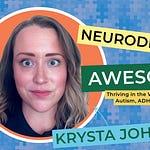[Recorded video is 44 minutes - timestamps below in addition to the transcript.]
Mark your calendars:
Are you ready to take control of your health and wellness in mid-life? We’re excited to invite you to our upcoming free 15-minute webinar on October 1st at 11am PT/2pm ET that’s specifically designed for women who want to understand and manage burnout while building sustainable wellness habits.
On Tuesday, some of you may have received a frantic text from me asking you to send me questions for this guest. You delivered so thank you!
If you haven’t figured it out already, I like to plan. But this conversation was anything but that other than “yeah, we need to do this.” To make a long story short, my friend, Dr. Lisa Klein, texted me and said “let’s just do an Instagram Live and we should do it now”. Or something to that effect.
So this wide-ranging and educational conversation was recorded over the course of two different IG Live sessions, with the technical chaos edited out and an intro thrown in.
About Dr. Lisa Klein
Dr. Lisa Klein is a practicing pediatrician at Child Health Associates, P.C. She stays busy with her three boys (two sons and one husband!). Dr. Klein received her B.A. in Psychology from Emory University and her Doctor of Medicine from Wayne State University.
Dr. Klein is also a co-founder of Turning Teen, which aims to start the conversation around puberty and sexual health with pediatrician-developed educational programs in classrooms, community settings, or at home. After spending years teaching residents and medical students at William Beaumont Hospital, Dr. Klein is excited to help educate tweens of all ages about their changing bodies, and help other parents like her have “those talks” with their kids.
If you’re interested in attending one of her workshops, check out the latest schedule here.
NOTE: This podcast does not establish a provider-patient relationship and is for informational purposes only. Before starting any kind of program, always check with your own medical team first.
Major Topics Covered
Appropriate age for weightlifting and usage of supplements for tweens/teens
Peer pressure in sports and situations to look out for
Getting your child to be active even if they aren’t into team sports
When does it make sense to ask for a referral to a dietician
Puberty starting earlier and how to advocate for your child
What you can do now to make the conversation less awkward down the road
Teens and birth control methods
Impact of pornography and how you can counteract
How to talk to your child about masturbation
Impact of social media on teens with respect to stress and anxiety
Go Long recommends listening to the entire podcast for context, but knows you are all busy people so below you will see timestamps.
Ways to Connect with Dr. Klein
Other Links Mentioned
Book: Celebrate Your Body 2: The Ultimate Puberty Book for Pre-teen and Teen Girls (by none other than Dr. Lisa and her partner Dr. Carrie Leff!!!)
Ways to Connect with Go Long
Sign-up for Go Long’s newsletter, which is published twice per week
Schedule a complimentary consultation
Quick Takeaways
Dr. Klein: It’s important to start teaching your child from the second they can speak proper names for their body parts. You're already ahead of the game if you're doing that because you're already going to be ahead of the game when you have to talk about puberty.
With respect to birth control and if the person is not practicing abstinence, you need two forms - one is not enough. A barrier method to prevent sexually transmitted infections/diseases and one for birth control.
Jill: It’s not in your head that puberty is starting earlier for girls, especially with the onset of menstruation. There are some environmental factors that are contributing to this trend.
Advocate for yourself and advocate for your child. If you don’t feel you and/or your child is being heard, find another provider. You don’t have to suffer.
Timestamps
00:00 - 02:02 — Introduction and Dr. Klein’s backstory around creating Turning Teen
02:03 - 06:47 — Safe age to start weightlifting and the use of supplements (i.e., creatine, protein powders, energy drinks) for training1
06:48 - 10:56 — Overuse injuries, early specialization and peer pressure to train harder in team sports
10:57 - 16:06 — How to encourage healthy movement and nutrition habits even if your child isn’t a fan of team sports
16:07 - 19:10 — When is a referral to a dietician in order?
19:11 - 24:10 — The reasons behind puberty seeming to start earlier than when we were kids (NOTE: It’s not in your head; there’s data to back it up!)
24:11 - 26:50 — How to have the conversation with your pediatrician around puberty, particularly if your lived experience wasn’t positive and you don’t want the same challenges for your child
26:51 - 29:20 — Talking to your child about puberty and how to normalize it all to reduce the awkwardness
29:21 - 34:39 — Teens and birth control - considerations for different methods, how you can help them navigate this decision, resources for them on campus, etc
34:40 - 38:03 — Acknowledging the reality of pornography and changing the narrative around what healthy intimacy looks like; discussion around masturbation and how to talk to your child about it
38:04 - 42:43 — Social media usage: Should there be limits? How is it impacting stress and what can you do?
42:44 - 43:57 — Wrap-up!
"The American Academy of Pediatrics (AAP) has published position papers, a subject review, guidelines, and textbook chapters regarding the use of performance-enhancing substances, including creatine, by children and adolescents. A report appearing in Pediatrics expressed concern about the widespread use of creatine in young athletes as being troubling for two reasons. First, there are few studies on the long-term effects of creatine in those under 18 years of age. Second, there is concern that young athletes taking performance-enhancing nutritional supplements and those taking banned substances such as anabolic steroids represent two points on a continuum (“the gateway concern”). A 2016 clinical report from the AAP Council on Sports Medicine & Fitness updated and consolidated information on this topic and should be read by all pediatric providers.
The bottom line is that the AAP argues against the use of creatine supplements in those 18 years of age and younger and that until more information is available about safety in children and adolescents, health care providers should discourage use of creatine in their children and adolescents. This message has been promulgated in the national media. The American Academy of Orthopaedic Surgeons supports the position of the AAP."













Share this post